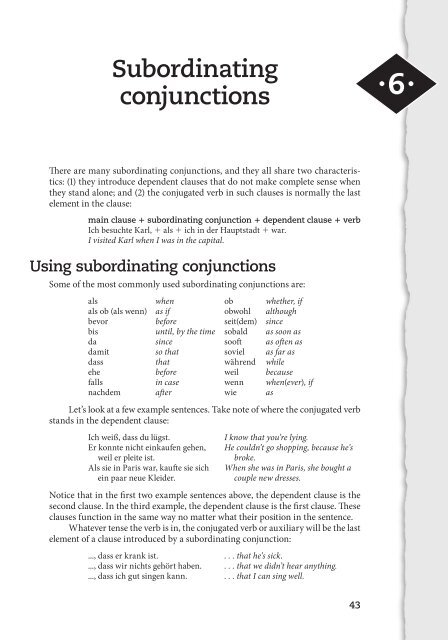german_sentence_builder
Create successful ePaper yourself
Turn your PDF publications into a flip-book with our unique Google optimized e-Paper software.
Subordinating<br />
conjunctions<br />
·6·<br />
There are many subordinating conjunctions, and they all share two characteristics:<br />
(1) they introduce dependent clauses that do not make complete sense when<br />
they stand alone; and (2) the conjugated verb in such clauses is normally the last<br />
element in the clause:<br />
main clause 1 subordinating conjunction 1 dependent clause 1 verb<br />
Ich besuchte Karl, 1 als 1 ich in der Hauptstadt 1 war.<br />
I visited Karl when I was in the capital.<br />
Using subordinating conjunctions<br />
Some of the most commonly used subordinating conjunctions are:<br />
als when ob whether, if<br />
als ob (als wenn) as if obwohl although<br />
bevor before seit(dem) since<br />
bis until, by the time sobald as soon as<br />
da since sooft as often as<br />
damit so that soviel as far as<br />
dass that während while<br />
ehe before weil because<br />
falls in case wenn when(ever), if<br />
nachdem after wie as<br />
Let’s look at a few example <strong>sentence</strong>s. Take note of where the conjugated verb<br />
stands in the dependent clause:<br />
Ich weiß, dass du lügst.<br />
Er konnte nicht einkaufen gehen,<br />
weil er pleite ist.<br />
Als sie in Paris war, kaufte sie sich<br />
ein paar neue Kleider.<br />
I know that you’re lying.<br />
He couldn’t go shopping, because he’s<br />
broke.<br />
When she was in Paris, she bought a<br />
couple new dresses.<br />
Notice that in the first two example <strong>sentence</strong>s above, the dependent clause is the<br />
second clause. In the third example, the dependent clause is the first clause. These<br />
clauses function in the same way no matter what their position in the <strong>sentence</strong>.<br />
Whatever tense the verb is in, the conjugated verb or auxiliary will be the last<br />
element of a clause introduced by a subordinating conjunction:<br />
..., dass er krank ist. . . . that he’s sick.<br />
..., dass wir nichts gehört haben. . . . that we didn’t hear anything.<br />
..., dass ich gut singen kann. . . . that I can sing well.<br />
43



